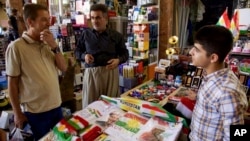A former U.S. diplomat says there's no way to derail Iraqi Kurdistan's independence referendum next Monday, despite efforts by the U.S. and other countries to have the vote postponed.
"There really is no possibility of calling it off," said Peter Galbraith, who took a special interest in the Kurdish situation in the late 1980s and early '90s and helped uncover former Iraq leader Saddam Hussein's use of poison gas against the minority group. "You can't call off an election four days before it's going to take place.
"It's impossible to think that the leadership would then cancel the referendum," Galbraith, a former U.S. ambassador to Croatia, told VOA Kurdish by phone from Irbil, the capital of the Kurdish region. "They would have no credibility with their population. It would be very destabilizing."
He said the Iraqi government's efforts to delay the vote and start negotiations with Kurdish leaders were somewhat halfhearted, unlike successful campaigns by Britain against independence for Scotland and Canada's efforts against independence for Quebec.
"Baghdad has stated very clearly and publicly … that they will only accept a solution within the Iraqi constitution, a constitution that they themselves have not honored," Galbraith said. "You can't call off a referendum in exchange for negotiations where one side has said the only solution is going to be on their terms and not what you want."
Brett McGurk, the Special Presidential Envoy for the Global Coalition to Defeat ISIS, said Friday the referendum “carries a lot of risks” that are out of the control of the U.S.
“The (Kurdish) referendum just carries an awful lot of risks and that's not something the United States can control. ... In terms of the consequences of the referendum it’s not something that we can fully control, (it) just carries a lot of risks,” he said.
Turkey's National Security Council called the referendum “illegitimate and unacceptable” in a statement, and threatened to use its “rights” in line with international agreements.
A clear path
Galbraith, who has been serving as an unpaid adviser to the Kurdistan Regional Government and once worked with the U.N. transitional administration in East Timor after it gained independence, said the path for Kurdistan is clear.
"Once the people vote, and we presume they'll vote overwhelmingly for independence, that's going to be the destination," he said. "The negotiations will have to take place after the referendum, and they will be about independence. Now, it might take a couple of years to get to independence. There might be some interim step — a confederation or something else."
He also dismissed any suggestion that the U.S. and other countries would not accept a declaration of independence.
"Every time a new country emerges, the United States is against it," Galbraith said. "They wanted to hold the Soviet Union together, they wanted to hold Bosnia together. I think the pattern is the same. Once Kurdistan votes for independence and moves toward independence, the United States will accept it."





